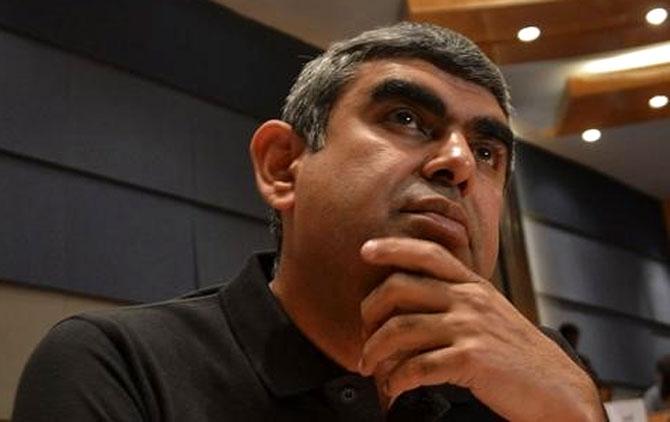Takes a knock after RBS changes plan on Williams & Glyn; contract loss to impact 3,000 Infy staffers

Infosys chief executive officer (CEO) and managing director Vishal Sikka’s plans to stabilise business and focus on higher growth at the Bengaluru-based company faced a Brexit impact after the Royal Bank of Scotland (RBS) shelved plans to set up a separate bank in the United Kingdom (UK), for which Infosys was a key technology partner. Infosys could lose as much as $50 million as it plans to shift 3,000 people from this project to other clients.
RBS’ decision to shelve its plan for Williams & Glyn (W&G) to be listed as a separate bank in the UK is ascribed to the economic uncertainty following Britain’s decision to quit the European Union.
Infosys had, in 2013, won majority of the €300-million deal to build applications for W&G.
“It is a start of things to come because of the Brexit impact. There will be several banks that will re-evaluate UK operations. It will have big impact not just on Infosys but also other Indian companies that have exposure to the UK, Europe banking sector,” says Pareek Jain, vice-president in the Bengaluru office of HfS Research.
“In Infosys’ case, we have got visibility. There will be many others, which will not come out. More importantly, it is a sign of things to come (for the Indian information technology, or IT, sector).”
The UK contributed to nearly $20 billion or 18 per cent of India’s $108-billion software exports for 2016, according to software industry lobby National Association of Software and Services Companies (Nasscom).
Majority of the revenue comes from servicing banking and financial clients such as RBS and Lloyds, which have been outsourcing to Indian firms such as Infosys and Tata Consultancy Services to cut costs and improve efficiency in their operations.
Last week, Nasscom said it would maintain its February forecast of 10-12 per cent growth this financial year for the software sector, which generates a third of its revenues from banking and financial services clients.
It is not just Infosys that has faced tremors due to the Brexit impact. Last week, Infosys’ smaller rival Nasdaq-listed Cognizant Technology Solutions cut for the second time in two quarters, its annual forecast citing uncertainty with its banking and financial and healthcare clients. The British Pound’s fall after the Brexit decision by British citizens wiped off $40 million in revenue for Cognizant in the last quarter.
For Sikka, the RBS W&S deal loss comes as a fresh challenge to his $20 billion revenue target by 2020 and a month after he cut revenue forecast for the year ahead, citing client uncertainty. Sikka, the first non-founder CEO at Infosys slashed dollar revenue guidance to 10.5-12 per cent from 11.5-13.5 per cent he forecast in April.
Since July, Sikka has revamped his leadership team by expanding roles to performers such as Ritika Suri and Deepak Padaki and bringing a Google engineer Sudhir Jha to push Mana, the artificial intelligence platform that he is betting on to get significant jump in revenue without adding people.
In recent quarters, Infosys has pushed to win deals at lower prices, compensating its traditionally higher margins for growth. With a reputation and a good clientbase, analysts say, it also has room to cut prices, but other software outsourcers are also joining the pricing game.
“It appears that the industry is now moving to match Infosys on price, which is a major contributor to the recent deceleration. This is why Infosys has lowered its guidance for the year to reflect the increased challenges,” says Peter Bendor-Samuel, founder and CEO of Everest Group, the IT researcher and consultancy, adding, “This, however, would place them in a conundrum, trading growth for margin, a trade which until now they have tried to avoid. The past two years has shown that when Infosys is a price-challenger, they are capable of meeting their growth targets. However, as the headwinds increase, this may come at the expense of lower margins.”
Photograph: Danish Siddiqui/Reuters







 © 2025
© 2025